Abstract
The importance of continuation and maintenance antidepressant therapy has been increasingly recognized, but usually focuses on tricyclic and selective serotonin reuptake inhibitor (SSRI) antidepressants. This review examines the evidence in support of classical monoamine oxidase inhibitor (MAOI) agents and the selective reversible monoamine oxidase type A inhibitor moclobemide in continuation and maintenance therapy. Phenelzine and tranylcypromine have demonstrated long-term efficacy but often cause intolerable side effects. Moclobemide is a well-tolerated alternative antidepressant, but there is a need for prospective controlled trials to evaluate its long-term efficacy.
Full text
PDF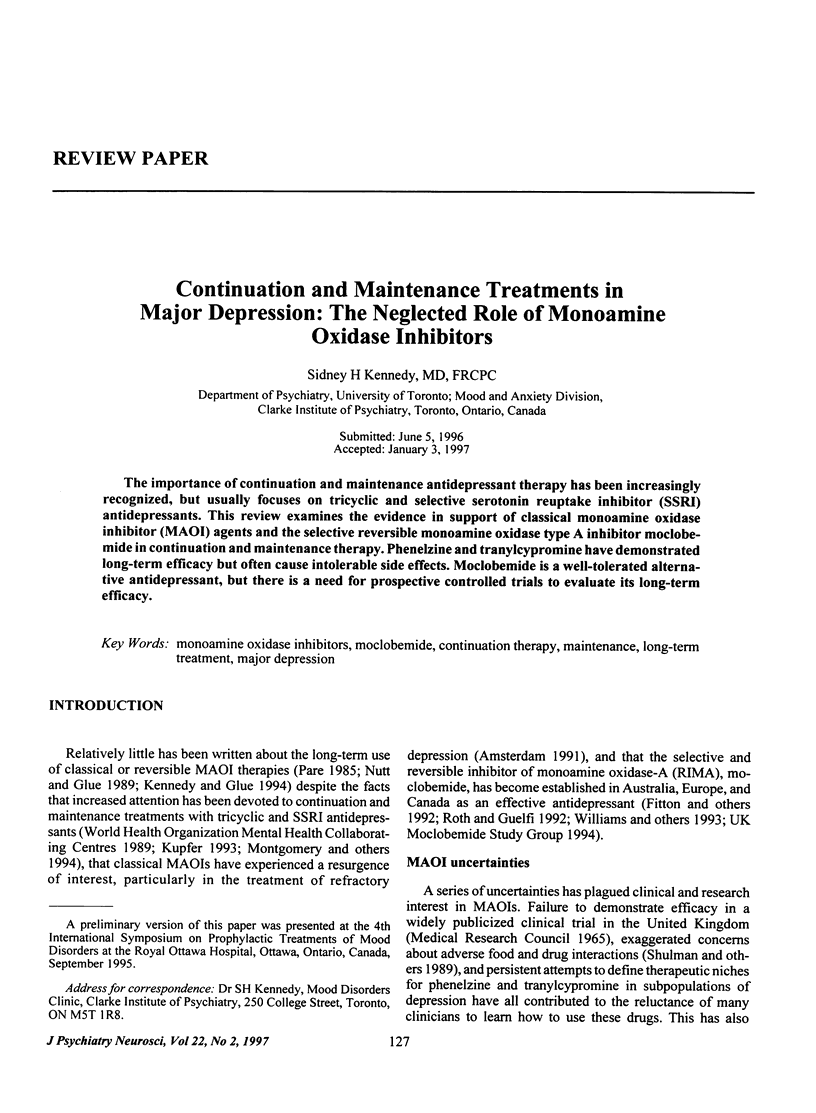
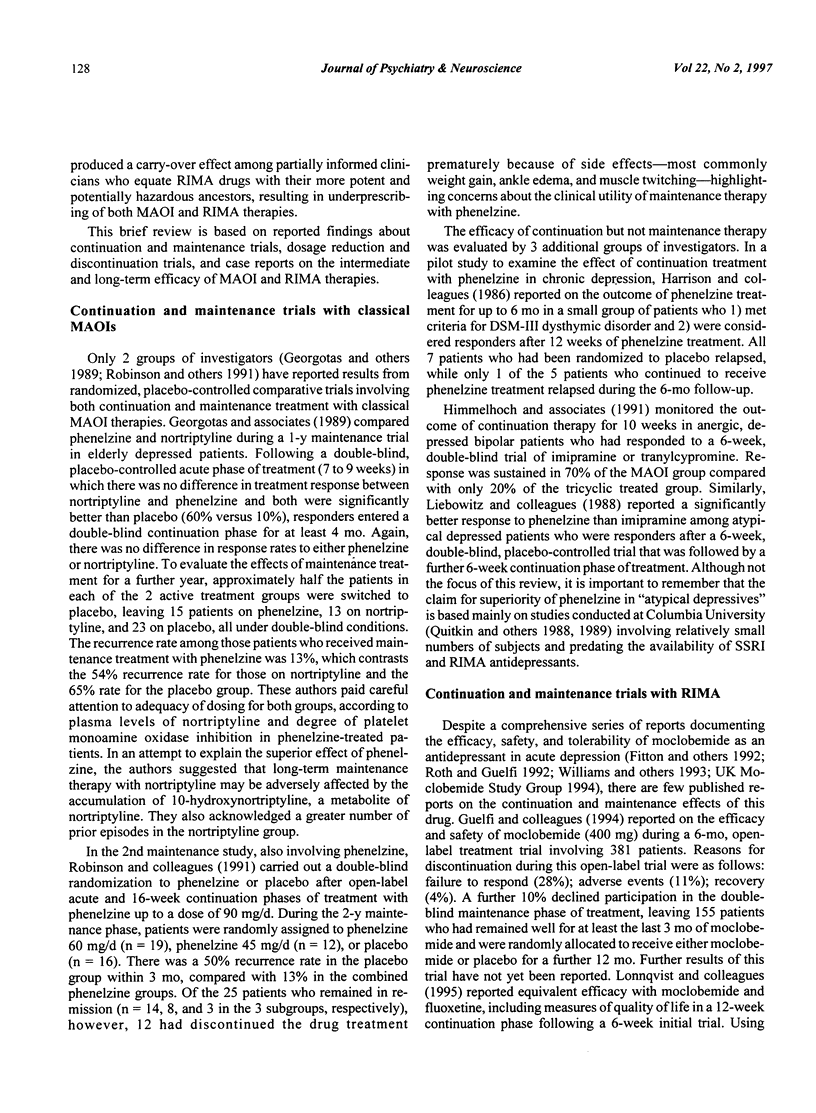
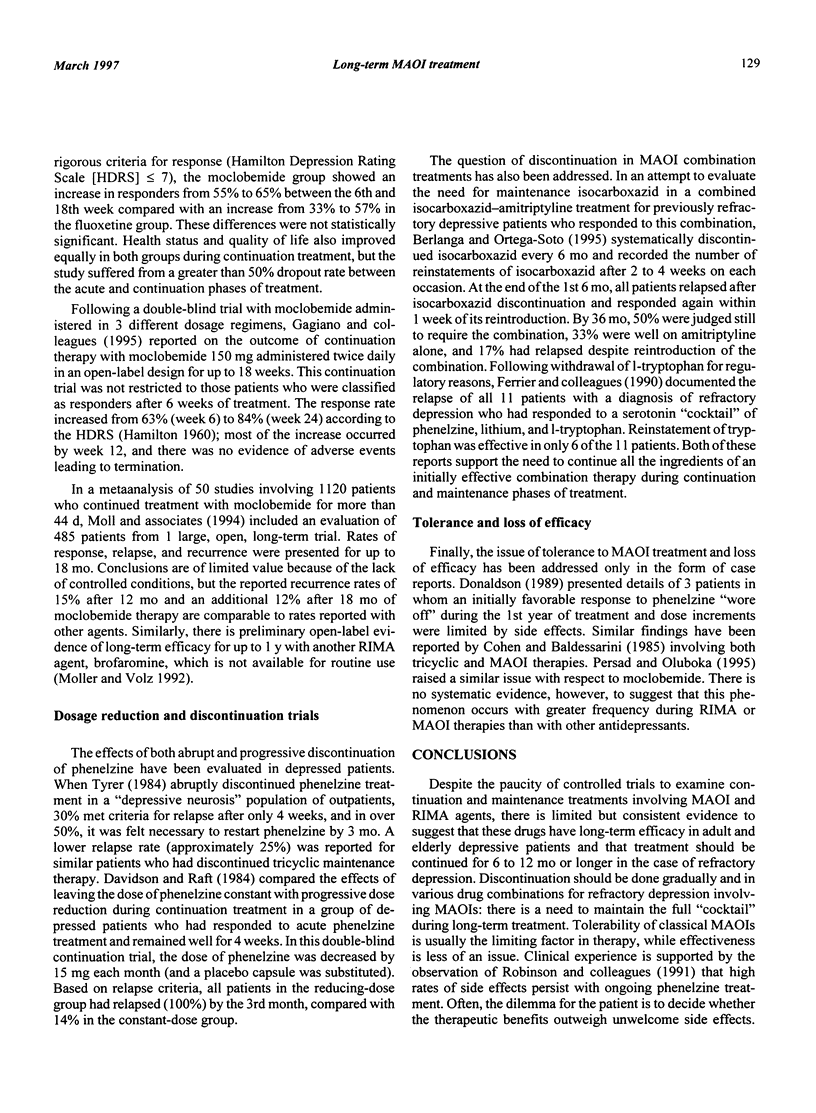
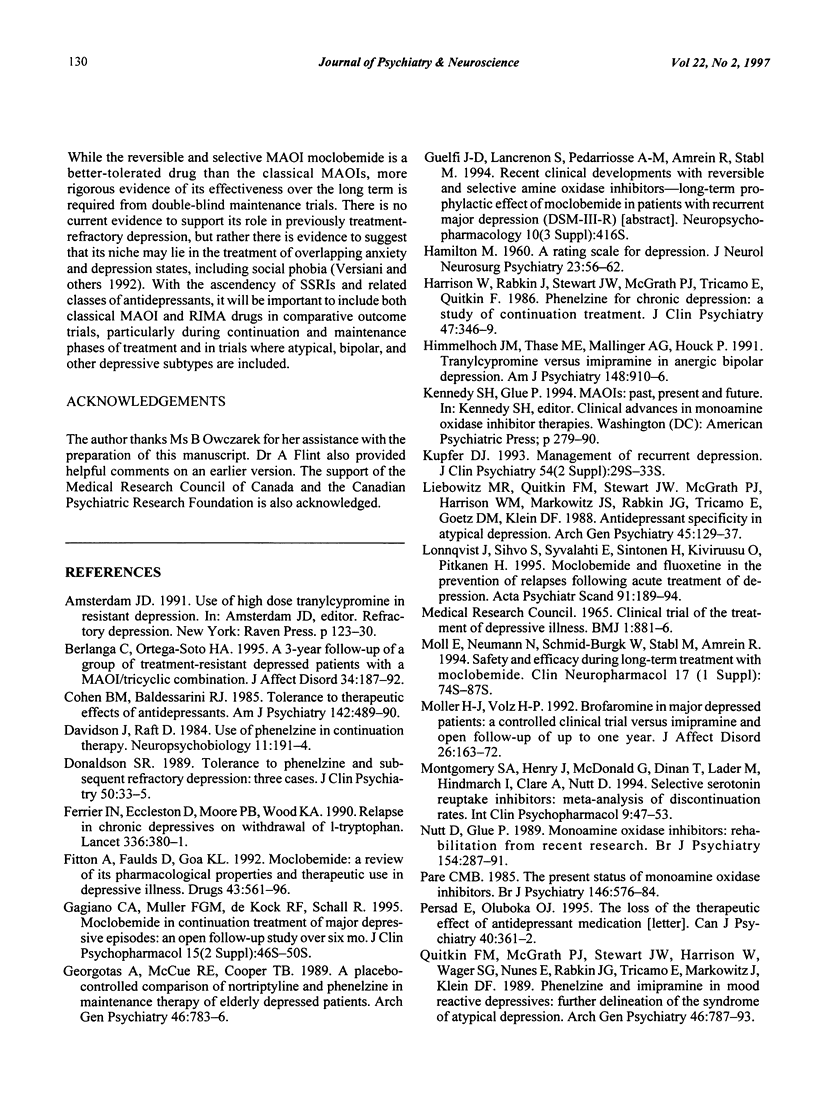
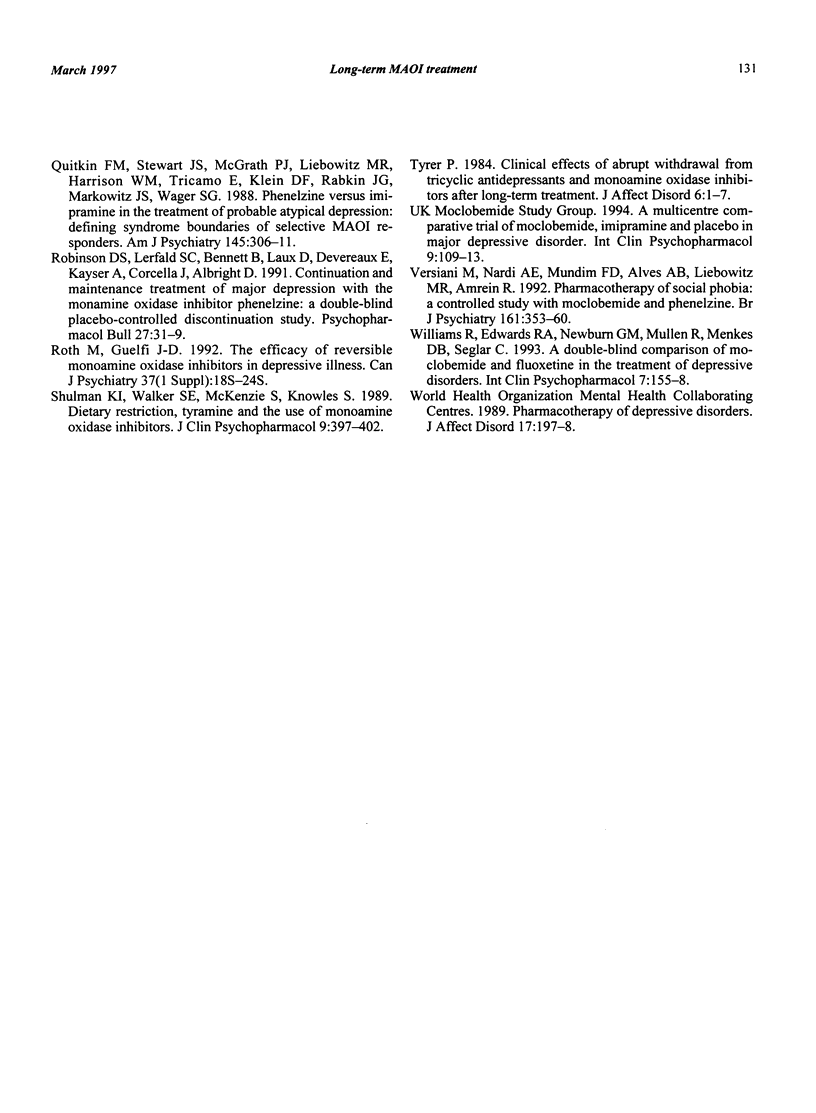
Selected References
These references are in PubMed. This may not be the complete list of references from this article.
- Berlanga C., Ortega-Soto H. A. A 3-year follow-up of a group of treatment-resistant depressed patients with a MAOI/tricyclic combination. J Affect Disord. 1995 Jun 8;34(3):187–192. doi: 10.1016/0165-0327(95)00016-g. [DOI] [PubMed] [Google Scholar]
- Cohen B. M., Baldessarini R. J. Tolerance to therapeutic effects of antidepressants. Am J Psychiatry. 1985 Apr;142(4):489–490. doi: 10.1176/ajp.142.4.489. [DOI] [PubMed] [Google Scholar]
- Davidson J., Raft D. Use of phenelzine in continuation therapy. Neuropsychobiology. 1984;11(3):191–194. doi: 10.1159/000118076. [DOI] [PubMed] [Google Scholar]
- Donaldson S. R. Tolerance to phenelzine and subsequent refractory depression: three cases. J Clin Psychiatry. 1989 Jan;50(1):33–35. [PubMed] [Google Scholar]
- Ferrier I. N., Eccleston D., Moore P. B., Wood K. A. Relapse in chronic depressives on withdrawal of L-tryptophan. Lancet. 1990 Aug 11;336(8711):380–381. doi: 10.1016/0140-6736(90)91927-3. [DOI] [PubMed] [Google Scholar]
- Fitton A., Faulds D., Goa K. L. Moclobemide. A review of its pharmacological properties and therapeutic use in depressive illness. Drugs. 1992 Apr;43(4):561–596. doi: 10.2165/00003495-199243040-00009. [DOI] [PubMed] [Google Scholar]
- Gagiano C. A., Müller F. G., de Kock R. F., Schall R. Moclobemide in continuation treatment of major depressive episodes: an open follow-up study over six months. J Clin Psychopharmacol. 1995 Aug;15(4 Suppl 2):46S–50S. doi: 10.1097/00004714-199508001-00009. [DOI] [PubMed] [Google Scholar]
- Georgotas A., McCue R. E., Cooper T. B. A placebo-controlled comparison of nortriptyline and phenelzine in maintenance therapy of elderly depressed patients. Arch Gen Psychiatry. 1989 Sep;46(9):783–786. doi: 10.1001/archpsyc.1989.01810090025004. [DOI] [PubMed] [Google Scholar]
- HAMILTON M. A rating scale for depression. J Neurol Neurosurg Psychiatry. 1960 Feb;23:56–62. doi: 10.1136/jnnp.23.1.56. [DOI] [PMC free article] [PubMed] [Google Scholar]
- Harrison W., Rabkin J., Stewart J. W., McGrath P. J., Tricamo E., Quitkin F. Phenelzine for chronic depression: a study of continuation treatment. J Clin Psychiatry. 1986 Jul;47(7):346–349. [PubMed] [Google Scholar]
- Himmelhoch J. M., Thase M. E., Mallinger A. G., Houck P. Tranylcypromine versus imipramine in anergic bipolar depression. Am J Psychiatry. 1991 Jul;148(7):910–916. doi: 10.1176/ajp.148.7.910. [DOI] [PubMed] [Google Scholar]
- Liebowitz M. R., Quitkin F. M., Stewart J. W., McGrath P. J., Harrison W. M., Markowitz J. S., Rabkin J. G., Tricamo E., Goetz D. M., Klein D. F. Antidepressant specificity in atypical depression. Arch Gen Psychiatry. 1988 Feb;45(2):129–137. doi: 10.1001/archpsyc.1988.01800260037004. [DOI] [PubMed] [Google Scholar]
- Lonnqvist J., Sihvo S., Syvälahti E., Sintonen H., Kiviruusu O., Pitkanen H. Moclobemide and fluoxetine in the prevention of relapses following acute treatment of depression. Acta Psychiatr Scand. 1995 Mar;91(3):189–194. doi: 10.1111/j.1600-0447.1995.tb09765.x. [DOI] [PubMed] [Google Scholar]
- Montgomery S. A., Henry J., McDonald G., Dinan T., Lader M., Hindmarch I., Clare A., Nutt D. Selective serotonin reuptake inhibitors: meta-analysis of discontinuation rates. Int Clin Psychopharmacol. 1994 Spring;9(1):47–53. doi: 10.1097/00004850-199400910-00008. [DOI] [PubMed] [Google Scholar]
- Möller H. J., Volz H. P. Brofaromine in major depressed patients: a controlled clinical trial versus imipramine and open follow-up of up to one year. J Affect Disord. 1992 Nov;26(3):163–172. doi: 10.1016/0165-0327(92)90012-u. [DOI] [PubMed] [Google Scholar]
- Nutt D., Glue P. Monoamine oxidase inhibitors: rehabilitation from recent research? Br J Psychiatry. 1989 Mar;154:287–291. doi: 10.1192/bjp.154.3.287. [DOI] [PubMed] [Google Scholar]
- Pare C. M. The present status of monoamine oxidase inhibitors. Br J Psychiatry. 1985 Jun;146:576–584. doi: 10.1192/bjp.146.6.576. [DOI] [PubMed] [Google Scholar]
- Persad E., Oluboka O. J. The loss of the therapeutic effect of antidepressant medication. Can J Psychiatry. 1995 Aug;40(6):361–362. doi: 10.1177/070674379504000623. [DOI] [PubMed] [Google Scholar]
- Quitkin F. M., McGrath P. J., Stewart J. W., Harrison W., Wager S. G., Nunes E., Rabkin J. G., Tricamo E., Markowitz J., Klein D. F. Phenelzine and imipramine in mood reactive depressives. Further delineation of the syndrome of atypical depression. Arch Gen Psychiatry. 1989 Sep;46(9):787–793. doi: 10.1001/archpsyc.1989.01810090029005. [DOI] [PubMed] [Google Scholar]
- Quitkin F. M., Stewart J. W., McGrath P. J., Liebowitz M. R., Harrison W. M., Tricamo E., Klein D. F., Rabkin J. G., Markowitz J. S., Wager S. G. Phenelzine versus imipramine in the treatment of probable atypical depression: defining syndrome boundaries of selective MAOI responders. Am J Psychiatry. 1988 Mar;145(3):306–311. doi: 10.1176/ajp.145.3.306. [DOI] [PubMed] [Google Scholar]
- Robinson D. S., Lerfald S. C., Bennett B., Laux D., Devereaux E., Kayser A., Corcella J., Albright D. Continuation and maintenance treatment of major depression with the monoamine oxidase inhibitor phenelzine: a double-blind placebo-controlled discontinuation study. Psychopharmacol Bull. 1991;27(1):31–39. [PubMed] [Google Scholar]
- Shulman K. I., Walker S. E., MacKenzie S., Knowles S. Dietary restriction, tyramine, and the use of monoamine oxidase inhibitors. J Clin Psychopharmacol. 1989 Dec;9(6):397–402. [PubMed] [Google Scholar]
- Tyrer P. Clinical effects of abrupt withdrawal from tri-cyclic antidepressants and monoamine oxidase inhibitors after long-term treatment. J Affect Disord. 1984 Feb;6(1):1–7. doi: 10.1016/0165-0327(84)90002-8. [DOI] [PubMed] [Google Scholar]
- Versiani M., Nardi A. E., Mundim F. D., Alves A. B., Liebowitz M. R., Amrein R. Pharmacotherapy of social phobia. A controlled study with moclobemide and phenelzine. Br J Psychiatry. 1992 Sep;161:353–360. doi: 10.1192/bjp.161.3.353. [DOI] [PubMed] [Google Scholar]
- Williams R., Edwards R. A., Newburn G. M., Mullen R., Menkes D. B., Segkar C. A double-blind comparison of moclobemide and fluoxetine in the treatment of depressive disorders. Int Clin Psychopharmacol. 1993 Jan;7(3-4):155–158. doi: 10.1097/00004850-199300730-00006. [DOI] [PubMed] [Google Scholar]


